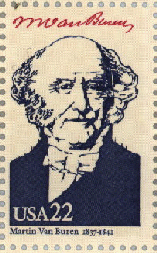
*** Index * < Previous chapter * Next chapter > ***
The election of 1832 was a unique one by the standards of the time. It was the first time that the respected parties would hold nominating conventions. It also included, for the first time, the introduction of a third party, the Anti-Masons. The three nominees were the incumbent, Jackson on the democratic ticket, Henry Clay for the republicans and William Wirt for the Anti-Masons[49]. The presence of the Anti-Masons was a great help to Jackson's campaign as it pulled favor from the republicans[50], a trait which has been historically proven to happen with the introduction of a third party. The most interesting aspect of the election was, however, the Bank issue[51].
The election served more of a purpose than just electing the president, it also served as a referendum for the Bank issue. After listening to two of his close advisers, Amos Kendall and William B. Lewis, Jackson put off announcing whom he would endorse as the candidate for Vice President[52] (at the time the position was not as a running mate but a separate nomination). This was done to ease Vice President John C. Calhoun out of office. Calhoun had fallen out of Jackson's favor following many disagreements on such issues as the Bank and, most notably, the Peggy Eaton affair.
Jackson wanted Van Buren in the position and chose him to be his successor.

|
Although, technically a tie, no one was holding their breath because, in the event of a tie, the Vice President casts the deciding vote in the Senate and, in this case, the vote went to John C. Calhoun[56]. Van Buren's allies made sure he would be nominated by putting into effect a two-thirds rule for nomination of the Vice President[57]. None of the other candidates who were proposed would have been successful in obtaining a two-thirds vote[58] and Van Buren won.
Once the controversy of whether or not Van Buren would be nominated was over, the Bank issue took center stage once again. Biddle threatened to make Jackson "pay the penalty for making the Bank a party question[59]". He spent $100,000 on the election and sent out 30,000 copies of the veto message in the hope that Jackson's own words would be his undoing[60]. The Jacksonians did the same thing but their aim was to compare the veto message to the Declaration of Independence by calling the institution a "gambler's Bank.[61]" Biddle's involvement however, gave Jacksonians the ammunition they had needed. He was using the resources of the United States Bank to channel funds into Clay's campaign, an obvious contradiction to his earlier stance that the bank should remain apolitical[62].
Jackson and his advisers recognized that the Bank issue could bury their chances of re-election[63], so they decided to win the election by hiding the issue behind Old Hickory, himself. By allowing Clay and his supporters to campaign with brochures[64] and in the newspapers, Jackson, literally, took to the streets. The idea was that fireworks, barbecues and parades would have had more of an influence than newspapers and brochures. The idea worked and with Jackson's re-election, despite the efforts of Biddle and his supporters, he gained back an edge in the Bank war.
*** Index * < Previous chapter * Next chapter > ***